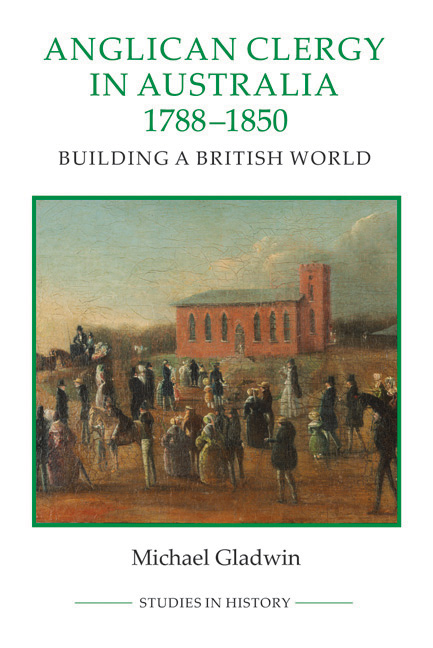Book contents
- Frontmatter
- Dedication
- Contents
- List of illustrations
- Acknowledgements
- Abbreviations
- Map
- Introduction
- PART I SINEWS: FUNDING, RECRUITMENT, BACKGROUNDS AND MOTIVATION, 1788-1850
- PART II CLERGYMEN IN COLONIAL AUSTRALIA, 1788-1850
- PART III SCENES OF COLONIAL CLERICAL LIFE: AUSTRALIAN CLERGYMEN AND VOLUNTARISM, 1836-50
- 8 The impact of voluntarism
- 9 Colonial quiverfuls: clerical family life
- 10 Clerical identity, laity and voluntarism
- Conclusion
- Bibliography
- Index
10 - Clerical identity, laity and voluntarism
from PART III - SCENES OF COLONIAL CLERICAL LIFE: AUSTRALIAN CLERGYMEN AND VOLUNTARISM, 1836-50
Published online by Cambridge University Press: 05 December 2015
- Frontmatter
- Dedication
- Contents
- List of illustrations
- Acknowledgements
- Abbreviations
- Map
- Introduction
- PART I SINEWS: FUNDING, RECRUITMENT, BACKGROUNDS AND MOTIVATION, 1788-1850
- PART II CLERGYMEN IN COLONIAL AUSTRALIA, 1788-1850
- PART III SCENES OF COLONIAL CLERICAL LIFE: AUSTRALIAN CLERGYMEN AND VOLUNTARISM, 1836-50
- 8 The impact of voluntarism
- 9 Colonial quiverfuls: clerical family life
- 10 Clerical identity, laity and voluntarism
- Conclusion
- Bibliography
- Index
Summary
John Mereweather, a perceptive clerical observer of Tasmania, Melbourne and Sydney dioceses, proffered his opinion of voluntarism in 1850. ‘The direct voluntary system’, he wrote, was a system in which ‘coarse-minded people often presume upon their contributions towards the support of the clergyman, and dictate to him in an indelicate manner.’ Although people contributed freely enough to support a minister in a new district, he added, when the novelty of having a clergyman wore off, or when they found that he was not a ‘mere puppet in their hands, and has ideas of his own’, some ‘cantankerous little-great man will withdraw his support, and persuade others to do the same’. Mereweather was far more concerned about maintaining independence from the laity than from government. After touring Melbourne diocese he leapt at the offer of a Tasmanian chaplaincy in 1850, averring that government chaplaincy was more satisfactory than a cure funded by ‘direct’ voluntarism.
Mereweather's comments invite further questions about colonial clerical life after 1836. what were clergymen's attitudes towards laity, voluntarism and government? Did the increasingly semi-voluntarist nature of the Church alter the clergy's self-understanding of their identity and roles? This raises further questions about how relationships with laity and government altered, and whether this led clergy to de-emphasise traditional claims to independence from both laity and government. A subsidiary question concerns the extent to which regular clergy grounded their authority and identity in notions of apostolic mission or episcopal authority – as some scholars have suggested in relation to key metropolitan churchmen and colonial bishops – rather than in notions of establishment.
Clergy and laity after 1836
Clergy consistently complained of insufficient lay support, although they varied in their opinion as to whether this was due to unwillingness or inability. Clearly either could be the case in different places and at different times.
- Type
- Chapter
- Information
- Anglican Clergy in Australia, 1788–1850Building a British World, pp. 202 - 215Publisher: Boydell & BrewerPrint publication year: 2015

